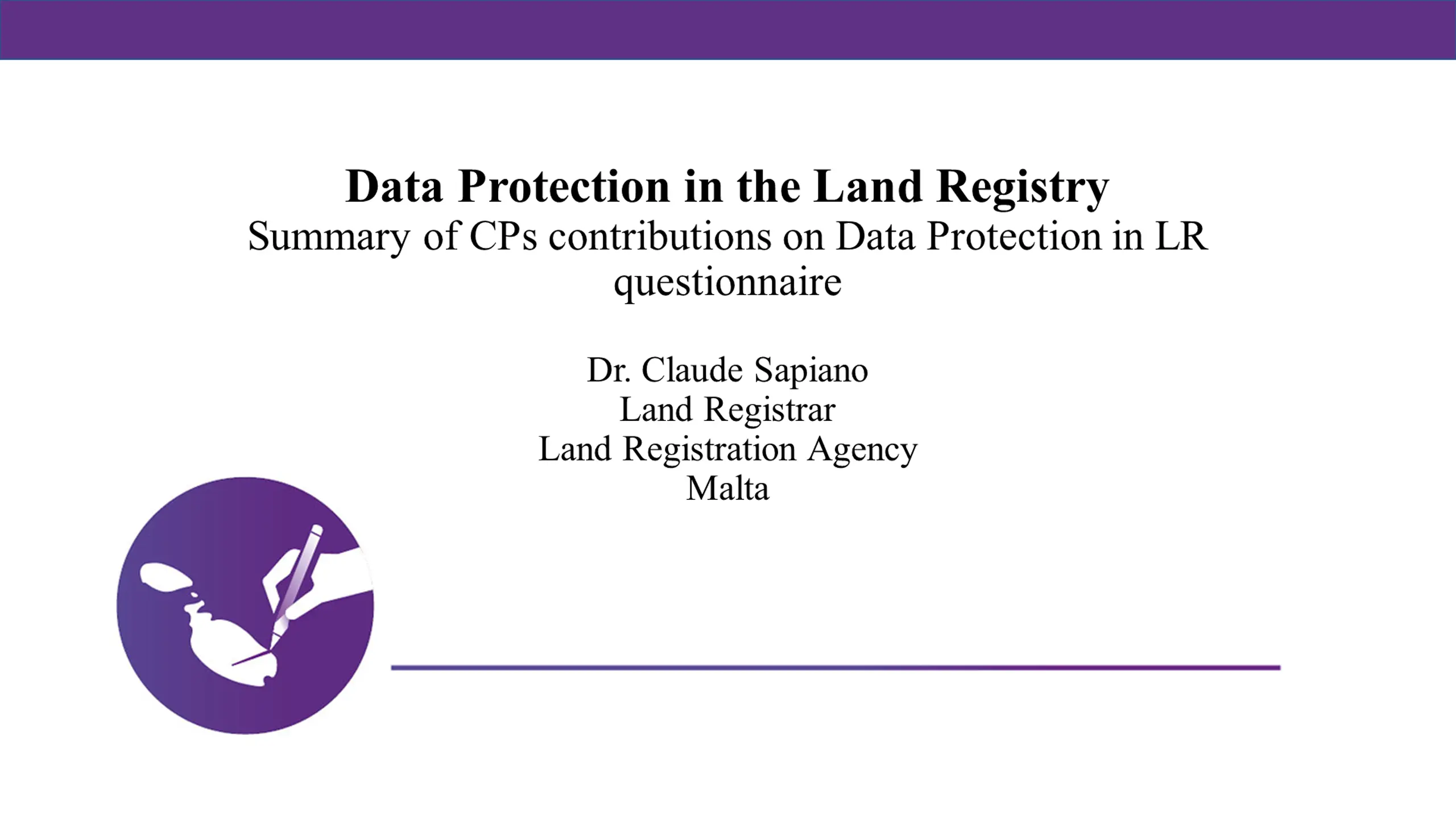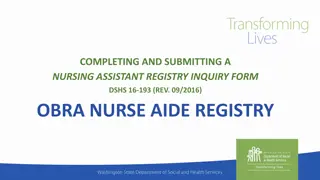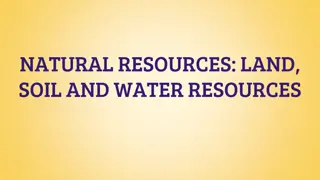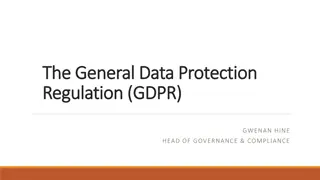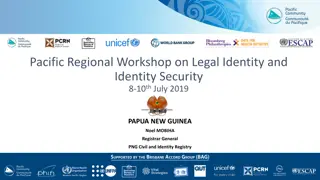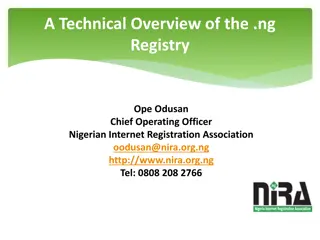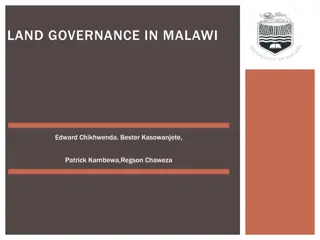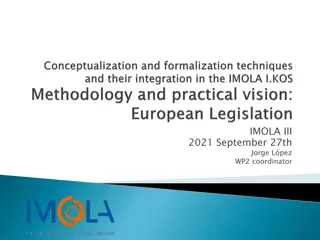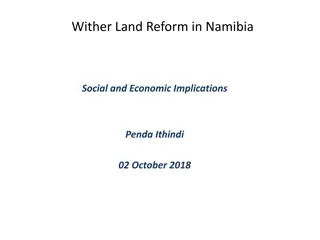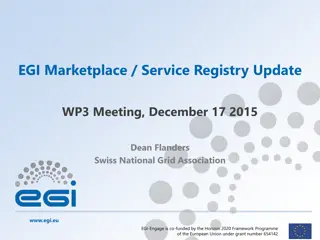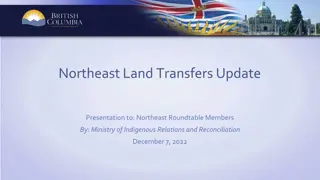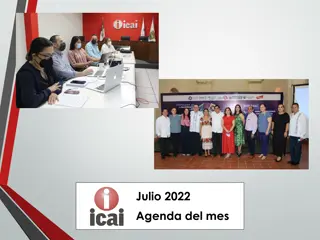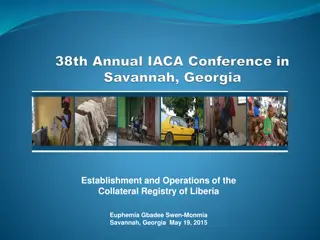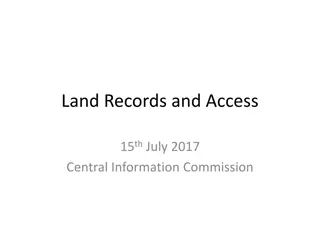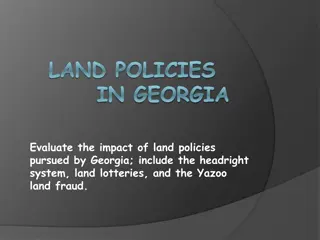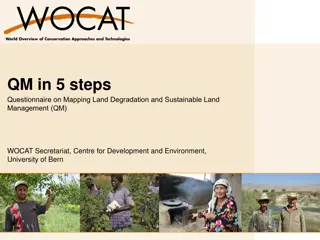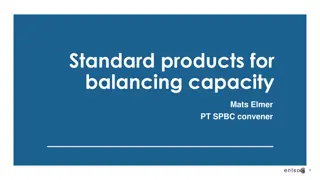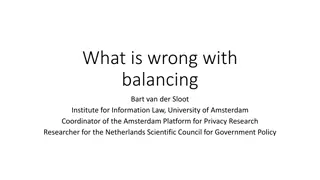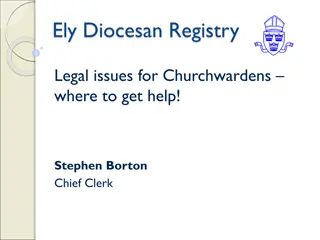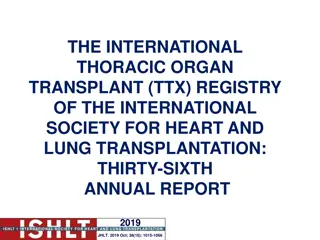Balancing Data Protection and Transparency in Land Registry
The contributions on data protection in the Land Registry questionnaire, discussing how different countries balance data protection with transparency in their online land registration systems.
Download Presentation

Please find below an Image/Link to download the presentation.
The content on the website is provided AS IS for your information and personal use only. It may not be sold, licensed, or shared on other websites without obtaining consent from the author.If you encounter any issues during the download, it is possible that the publisher has removed the file from their server.
You are allowed to download the files provided on this website for personal or commercial use, subject to the condition that they are used lawfully. All files are the property of their respective owners.
The content on the website is provided AS IS for your information and personal use only. It may not be sold, licensed, or shared on other websites without obtaining consent from the author.
E N D
Presentation Transcript
Data Protection in the Land Registry Summary of CPs contributions on Data Protection in LR questionnaire Dr. Claude Sapiano Land Registrar Land Registration Agency Malta
As I had stated in a previous presentation regarding Data protection, the Land Registration Agency in Malta is now in a very advanced stage where a new GIS based Online Land Registration System will be launched. This will be a technologically refreshed system which will make our Agency an almost paperless system.
The new system will be possibly open and accessible to the population in general with maybe varying levels of access according to the user. Due to this reason, the issue cropped up of how will we balance Data Protection with the transparency typical of Land Registry tradition. As we appreciate the feedback of the ELRA members regarding this issue we asked the following 2 questions that ELRA sent to the various contact points: 1. As regards countries having an online system of registration does Data Protection limit the information that can be easily accessed? 2. If yes what information is held from being made public ?
In this presentation, I will be presenting the following summary of the various replies:
Austria 1. The information of the Landbook is public. It is regulated by the Austrian Civil Code and the Law on Landbook. For the request of landbook information in general you do not present any legal interest. The only exception is the search based on the name of the owners where one has to show legal interest. 2. Information that is not publicly accessible is the content of the application (court cases on landbook) and documents that are attached to the application that are by court decision not open for public access. It is up to the court s decision to forward information if requested.
Bulgaria 1. According to Bulgarian legislation the entire property registration process as well as all notarial acts, are submitted to the registration offices only in paper. All users of the Registry Agency Portal have access to a number of services. The access to all online services in the Bulgarian Land Register requires basic registration and the adding of an authentication tool to the user profile. According to Bulgarian legislation, the Land Register is public and every user can access the database contained in it. 2. All online services provided by the Land register, requires one of the following 3 types of user authentication: Qualified electronic signature; Certificate, issued by the Registry Agency; Personal Identification Code (PIC) of the National Revenue Agency. Some of the services can only be provided on paper to the interested parties, such as the issuance of a certified copy of a notarial act and to make references on wills.
Croatia 1. Yes, Data Protection limits the information that can be easily accessed. 2. Information on the list of real estate owned by certain natural or legal persons is held form being made public. In the Land Registry Act of the Republic of Croatia it is prescribed that the judicial authorities and competent State Attorney s office and The Ministry of Finance, Tax Administration shall have access to data when necessary to perform tasks within their competence. A competent court can also grant access to data to those persons who present the probable existence of legal interest.
Estonia 1. Yes. 2. The data of registered immovables is public but in order to access it, a fee must be paid and one must also need to authenticate himself in order to search by a person s name or personal identification number. In Estonia, X-Road (data exchange layer) and ID-Card (authentication) together create a technical possibility for Data Tracker.
Finland 1. According to the Finnish Act on the Openness of Government Actions, all official docs are primarily in the public domain, with some exceptions. 2. Section 24 in the Act specifies the secret official documents that should be held from public for example for the Land Registry. The most relevant secret official documents are those containing data such as on annual income, net worth of a person etc.
Italy 1. Complying with the GDPR, the Land Registry has provided some limits. Land Registry documents are published on the web: all customers are entitled to get a copy. Thereby it is mandatory to provide the access only with redacted information, without personal data. To comply with the GDPR, the Land Registrar has to identity any personal data, and he/she has to arrange a certified copy of the document on which he/she will remove the data. 2. Only redacted documents are published. The most difficult aspect is to find balance between the data protection s aim and one of the crucial characteristics of the Land Registry which is public and accessible to everyone. An example of when the Land Registrar has to provide redacted copy of the deed is Separation or divorce decree containing personal data regarding behavior that led couple to separate.
Poland 1. In Poland, there are no online applications for land and mortgage registers. Only a notary, court and tax bailiff submit applications via the ICT system. Pursuant to the Act of 6 July 1982 on land and mortgage registers and mortgage, land registers, as public legal registers, are established and kept in electronic form. The Central Land Registry Information performs its tasks through the ICT system. This system enables access to the Central Database of Land and Mortgage Registers. 2. The land and mortgage register number is a protected personal data.
Slovak Republic 1. The proposal can be submitted electronically or in paper form. In both cases the employee deciding on the proposal assesses the fulfillment of the conditions for allowing the record. 2. A restrictive approach to the collection of documents is applied. The birth number and other identifier of the foreigner, the amount of debt and information about the price of property are not available. This information is only made available to the owner.
Sweden 1. Yes to some extent. But there is also legislation that limits or prevents direct access to information from the immovable property register or the digital system which contains the underlying applications and documents. 2. Difficult to answer since the limitations are different in different e-services and depend on various regulations not only GDPR. Registered owner have an extensive right to get information from land register. Anyone can request an excerpt from the immovable property register in accordance with the constitutional right to have access to public documents. Access to the information may only be denied if the information falls under regulation of secrecy.
Netherlands 1. Yes to some extent. But there is also legislation that limits or prevents direct access to information from the immovable property register or the digital system which contains the underlying applications and documents. 2. In some cases we do not publish information with regard to the title- or right holders and/or the underpinning documents. To be excluded from the issuing of information one has to fulfil very strict (legal) requirements (e.g.: being noted on a list kept by the national coordinator for Counterterrorism and security).
Turkey 1. Yes the information is limited by law and information security policy. 2. Owners identification information is held from being made public. Descriptive information of the immovable can be accessed by anyone without any restrictions. According to the Turkish Civil Code, the rights and the restrictions on the immovable can be accessed by only those that make their legal interest believable. Information other than these can be accessed by legal authority or court decision.
Romania 1. The information regarding the status of a real estate registered in the database may be consulted by any person using his identification data. Any interested person may consult the file with documents, in compliance with the legal provisions on processing of personal data. 2. Certain information cannot be made public and this includes amongst others information about real estate and information belonging to institutions in the field of national defense, security and public order. In the case of personal data, consent of the individuals regarding the processing of personal data is requested. Public information of personal interest may not be transferred between public authorities, except under a legal obligation or with the prior written consent of the person who has access to that information.
Spain 1. Yes there is a limit to the information that can be accessed. Article 221 of Mortgage Law states: The Registries will be public for those who have a known interest in ascertaining the status of the registered real estate or rights in rem. The interest shall be presumed in any authority, employee or public official acting by reason of his office or position . The interest should be manifested before asking for any data. Depending on the interest manifested before the Registrar, the information will be given or not. 2. General information which is given to the public includes Ownership: name, surnames and ID and Description of the registered property. General information which is held from being public includes Data without legal significance, Non- patrimonial data and Civil status Exceptionally, it is granted access to the record of the registration folio.
Cyprus 1. Yes 2. Ownership Details Name & ID of Property Owner is only available to the owner of the property as well as to interested parties as prescribed by the law. In addition Banks are allowed to have access to this kind of information as mortgage lenders.
Lithuania 1. Yes 2. The data of the Real Property Register, with the exception of the personal identity code of a natural person and information constituting a state secret, are public. However, archival data of the Real Property Register, data on the entire personal property and documents, on the basis of which the registration was made, can be provided only to a limited group of persons.
Portugal 1. According to article 1 of the Land Registry Code (LRC), the purpose of Portuguese LR is to publicize the legal status of immovable property, considering the security of real estate and legal trade. To that extent the information provided by land registry can be accessed by all without restrictions. However, data protection rules do not allow searches by owner name. Only searches by property are allowed. 2. The land registry information is only made public when the registration is confirmed and paper or online certificates can be requested. Regarding natural persons the information usually include the Name of the owner. There may be also other identification numbers but not the ID or national identity card. A reference to the spouse may be included. In case of legal person, information will usually include the Name of the company, the ID/Registration number and the Registered office. Only the information required by law and referred to above is public. The remaining information is protected.
From what we can analyse it is clear that although variations exists across countries which is natural as different countries have different laws and approaches, it is clear that almost all countries try to balance the public nature of the Land Registry with the requirements of Data Protection. The Land Registration Agency in Malta thanks all the CP s who contributed to the questionnaire. These contributions will help The Land Registration Agency in Malta even more to shape our new GIS based online System, keeping in view the reality of Data Protection.
